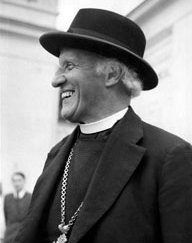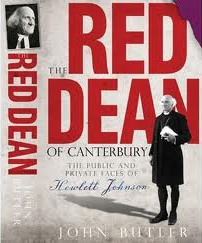Lectures
7th November 2012: The Red Dean: The Life and Times of Hewlett-Johnson


After a last-minute change of premises, the sixty members who stayed the course were rewarded with a superb lecture from Professor John Butler on The Red Dean: The Life and Times of Hewlett-Johnson.
Hewlett-Johnson was the renowned Dean of Canterbury Cathedral from 1931-1963, famous for both his mesmerising oratory and his adherence to Communism. He served four Archbishops, two of whom, Cosmo Gordon Lang and Geoffrey Fisher, loathed him. Prof Butler recalled a number of incidents involving one Archbishop [Fisher] and the Dean with perhaps the most emotion-fuelled encounter when Malenkov, the important Soviet politician, with two obviously-armed bodyguards, visited H-J one Easter Sunday. Malenkov wanted to see the Cathedral and Hewlett-Johnson obliged but his little tour ran into the clerical procession leaving the nave, led by Fisher, en route to the vestry. The Archbishop was enraged, as Prof Butler, who has been able to read all 14,000 of the pieces of paper in the Hewlett-Johnson archive in the University, discovered from the irate letter sent to the Dean by Fisher in the following week. Accusations of desecrating the Cathedral by the presence of heathens were subsequently answered by H-J in a wonderfully skilful reply, superficially compliant but subversively dismissive.
Hewlett-Johnson was born into a wealthy industrialist family in Manchester in 1874 and eventually studied both Mechanical and Civil Engineering. By attending a series of lectures on Geology, and reading Darwin, H-J discovered the real age of the Earth and lost the fundamentalist Christianity imbibed from his pious mother. Eventually he read Theology at Wadham College, Oxford and was sent back to Manchester in 1905, to Altringham, a parish with both enormous wealth and appalling slums. In 1921 he became Dean of Manchester under William Temple, a future Archbishop of Canterbury, who was probably significant in Hewlett-Johnson's subsequent elevation to Canterbury.
The traditional hierarchy in Canterbury rejected H-J on grounds of his Northern birth, engineering background, non-Oxbridge education, and especially his Communism. His empathy with the poor; his spell-binding oratory in which he saw the Gospel in political terms such as brotherhood, equality, freedom from want; his singular ability to withstand overt criticism and stand alone; all served to inspire hatred and adoration in equal measure. His robust Communism and his important friendships with people such as Stalin and Mao Tse Tung, in particular, caused the opening of a Security file on him in 1917 which was not closed until MI5 surveillance ceased in 1952.
Averil Clayton
Photograph © http://www.kent.ac.uk

